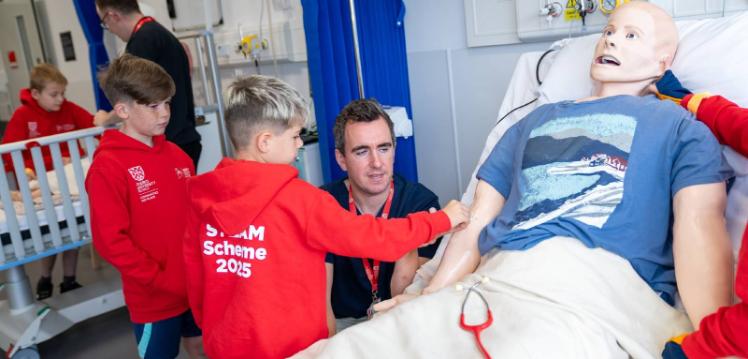
Enhancing Local Communities with Queen’s University Belfast and the STEAM Scheme
Queen’s University Belfast has established itself as a leading institution dedicated to fostering community development and youth empowerment. Central to this mission is the innovative STEAM Scheme, a summer program designed to ignite curiosity and build skills in science, technology, engineering, arts, and mathematics among young people. Focused on Belfast’s vibrant Market community, this initiative exemplifies how higher education institutions can collaborate with local organizations to create meaningful opportunities for youth.
The Significance of the Queen’s STEAM Scheme in UK Education
The UK education landscape increasingly emphasizes experiential learning and community engagement. Queen’s University Belfast’s STEAM Scheme aligns with this trend by providing hands-on experiences that complement traditional classroom education. Participants benefit from exposure to cutting-edge facilities and real-world applications of STEAM fields, making learning more exciting and relevant. This approach helps bridge the gap between academic theory and practical skills, preparing students for future careers.
Impact on Youth Empowerment in the Belfast Area
Programs like the STEAM Scheme are vital for empowering young people, particularly those from underserved communities such as Belfast’s Market. By providing access to university-level facilities and mentorship, the scheme encourages participants to envision themselves as future innovators and problem-solvers. The positive influence of this scheme extends beyond individual skill development; it fosters a sense of belonging and confidence that can inspire long-term engagement with education and community involvement.
Partnerships Driving Community Engagement and Innovation
The success of the STEAM Scheme stems from strategic collaborations between Queen’s University Belfast and the Market Development Association, among others. These partnerships facilitate resource sharing, mentorship, and community outreach, ensuring the program’s relevance and sustainability. The university’s facilities, such as the medical simulation center and marine laboratory, offer unique environments where participants can explore scientific and technological concepts firsthand.
Hands-On Learning in State-of-the-Art Facilities
One of the key features of the STEAM Scheme is its practical orientation. Young people participate in activities like medical simulation exercises at Queen’s renowned KN Cheung SK Chin InterSim Centre and fieldwork at the Marine Laboratory in Portaferry. These experiences allow youth to see the real-world impact of STEM careers and inspire aspirations that might have previously seemed out of reach.
Achieving Sustainable Community Development Through Education
The broader goal of the STEAM Scheme is to promote sustainable development by empowering the next generation. By raising awareness of local environmental issues through activities with the Centre for Climate Biodiversity and Water, the program reinforces the importance of sustainable practices. Additionally, outdoor archaeology activities by the Queen’s Community Archaeology Programme NI connect youth with Belfast’s rich history, fostering cultural pride alongside scientific curiosity.
Measuring Success and Future Prospects
The culmination of each year’s program is a graduation ceremony that celebrates participant achievements and encourages future engagement with STEAM education. Feedback from community leaders and participants indicates increased confidence, skills, and aspirations. Looking ahead, Queen’s University Belfast aims to expand the scheme’s reach and deepen community ties, creating a legacy of youth empowerment and local innovation.
How Communities and Educational Institutions Can Support Similar Initiatives
Replicating successful programs like the STEAM Scheme requires collaboration, resource investment, and a clear focus on community needs. Educational institutions should foster partnerships with local organizations, industry stakeholders, and government agencies to develop accessible programs that align with community aspirations. Moreover, integrating experiential learning opportunities into school curricula can extend the benefits beyond summer schemes, creating continuous pathways for youth development.
Engaging Stakeholders and Ensuring Long-Term Impact
Stakeholder engagement—including parents, teachers, local businesses, and youth organizations—is crucial for program sustainability. Regular evaluation and adaptation based on feedback help maintain relevance and effectiveness. Funding from public and private sources can support scalability, while showcasing success stories encourages broader participation and community buy-in.
Conclusion: Building a Brighter Future Through Local Educational Initiatives
The Queen’s University Belfast STEAM Scheme exemplifies how universities can actively contribute to community development and youth empowerment. By providing accessible, engaging, and real-world learning experiences, the program nurtures future leaders and innovators from Belfast’s Market community. Supporting and expanding such initiatives will be key to fostering inclusive growth and creating a resilient, skilled workforce prepared to meet tomorrow’s challenges.
Interested in exploring further opportunities for youth engagement and community development? Discover ways to support or participate in similar programs and help create lasting positive change at the local level.

